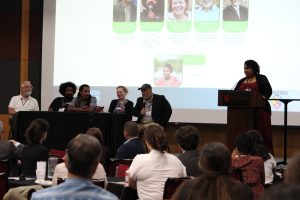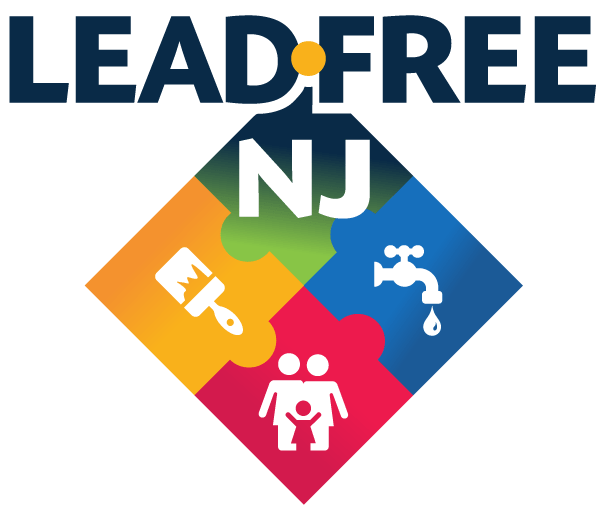First Ever Joint Membership Meeting Held by Jersey Water Works & Lead-Free New Jersey

From left to right: Rick Dovey, Atlantic County Utilities Authority; Anthony Diaz, Newark Water Coalition; Kelvin Boddy, Housing and Community Development Network of NJ; Debbie Mans, TWENTY TWENTY public affairs; Christopher C. Obropta, Ph.D., P.E., Rutgers Cooperative Extension Water Resources Program; Nicole Miller, MnM Consulting
“One thing is clear, equity is furthered by our continued collaboration,” announced Olivia Glenn, Chief of Staff and Senior Advisor for Equity U.S. Environmental Protection Agency, Region 2 Office, in her welcoming remarks at the Jersey Water Works and Lead-Free New Jersey Joint Membership Meeting. Historic legislation has been passed — namely, the American Rescue Plan, the Bipartisan Infrastructure Law, and the Inflation Reduction Act — which has led to the EPA garnering $130 billion toward the health, equity, and resilience of American communities. There is an unprecedented amount of money in grants the community should take advantage of, Glenn urged members to explore the Inflation Reduction Act website to learn more.
Members of Jersey Water Works, Lead-Free New Jersey, and water and lead advocates convened on July 12, 2023, for the first-ever Joint Membership Meeting to connect on water issues and the collective need for community input. The meeting took place at Rutgers, New Brunswick and was hosted by Rutgers Environmental and Occupational Health Sciences Institute (EOSHI). The event included networking during breakfast and lunch, three breakout sessions, five mini keynotes, and an information-facilitating world cafe.
Glenn remarked, “This is a massive opportunity to change the way the government operates and to create a rising tide that truly lifts all folks. Community has fought long for a seat at the table. They have struggled for their voice to be heard and their concerns to be addressed and they deserve reassurance that the EPA and all the organizations here have their back in this moment.” She recapped signs of progress, such as the creation of an Environmental Justice Office, Community Engagement Environmental Justice Team, Justice 40 Initiative, and the Federal Environmental Justice Scorecard.
Key collaborators helped kick off the Joint Membership Meeting with reflections on the current challenges NJ’s water agencies and communities face. Stephen Marks, Town of Kearny and JWW Steering Committee member emphasized the need to build resilience during storm events and the importance of public access to lead-free drinking water. Rashan Prailow, THINK Group and LFNJ Co-Chair announced the opening of a new community hub in South Jersey, and stressed the disproportional impact of lead on Black and brown communities. Dr. Helmut Zarbl, EOSHI reported the equipment of a lead detecting gun and invited the public to their monthly meetings explaining, “[We] can’t do occupational health without the community.”
The joint membership meeting facilitated increased collaboration, which was particularly timely given the ongoing efforts of JWW and LFNJ. The agency collective of JWW addresses issues of lead in drinking water (Lead in Drinking Water Task Force & Lead Service Line Replacement Work Group), bolstered by the advocacy collaborative of LFNJ who are seeking to increase awareness and solutions to lead in the environment. Heather Sorge, Program Manager Lead-Free NJ commented on the joint effort. “This is Lead-Free New Jersey’s first in-person meeting and an opportunity for the two collaboratives to learn from each other. The vision of a collective impact allows us to gather diverse stakeholders into this space to bring forth unprecedented change.”
To dig deeper into issues that the collaboratives care about, meeting members split into three breakout sessions:
- Affordability, Combined Sewer Overflow Permits, and a Stakeholder Session for feedback on NJF & EPIC’s SRF Research Study, hosted by the Jersey Water Works: Asset Management & Finance and Combined Sewer Overflow Committees
- Designing Climate Resilient Infrastructure, hosted by Jersey Water Works: Green Infrastructure and Climate Resilience Committees
- Aligning Policy and Community Action for a Lead-Free New Jersey, hosted by Lead-Free NJ Joint Steering and Advocacy Committee
Much of the work that JWW and LFNJ do is complementary, addressing public health issues such as lead in drinking water, and so bringing together stakeholders to advance their initiative is momentous. “We need multiple voices in the room to get this work done,” said Nicole Miller, Mnm Consulting and JWW Steering Committee Co-Chair when presenting the five keynote speakers.
- Holistic Approaches to Eliminating Lead Poisoning: Kelvin Boddy, Director of Housing and Community Development Network of NJ
- “Lead-Free NJ is not a monolithic organization, and that means when we’re in the same room this wealth of knowledge can be shared,” Boddy emphasized the utility of toolkits to gather information so discourse from collaborations like these doesn’t disappear.
- The Power of Community Owned and Managed Research to Identify and Address Lead Hazards: Anthony Diaz, Newark Water Coalition
- Anthony Diaz described assembling a community-led research team that tested lead in the water, paint, soil, and dust in 300 homes in Newark. He explained their data found soil to be the most contaminated. Diaz highlighted that “community groups should be in charge of their own narrative,” and the importance of doing so by providing accessible lead reports and influencing the youth to be involved in their community.
- Green Infrastructure: Where We’ve Been, Where We Are Going: Christopher C. Obropta, Ph.D., P.E., Rutgers Cooperative Extension Water Resources Program
- In 20 years, systems to mitigate stormwater have evolved, with major developments being required to use small scale green infrastructure to reduce CSOs and address water quality. Chris Obropta talked about the need to address existing development, coupling green and gray infrastructure, and encouraging young people to participate in the conversation.
- Water Sector Utilities as Community Anchors: Lessons Learned from 33 Years of Service: Rick Dovey, Atlantic County Utilities Authority (ACUA)
- Rick Dovey recounted the key takeaways from a career in water. Public coordination and outreach are crucial. He invited members to open their facilities to the public to spread awareness and asked the vital question, “How can we get more people looking at this industry as a viable career?”
- Aligning Our Actions: Celebrating Progress and Articulating Next Steps: Debbie Mans, TWENTYTWENTY public affairs
- Reducing lead in communities is achievable by working together, Debbie Mans stated. “We benefit from collaboration because we hear and learn from people with different perspectives and different solutions.” She implored members to consider opening up funding opportunities and leveraging new relationships that can be made at this conference.
To close off the conference, attendees were grouped into small tables to allow for more conversation about the keynote presentations and collaboration with each other through facilitation by JWW and LFNJ members. JWW Program Director Paula Figueroa-Vega concluded, “The work of both collaboratives requires bringing awareness to a larger audience so they can understand the gravity of the challenges and look for solutions. This meeting provided just that opportunity. Collective impact can only be achieved through these collaborations, where walls are broken down and we sit with and learn from each other.”
Jersey Water Works is working to transform New Jersey’s inadequate water infrastructure through sustainable, cost-effective solutions that provide communities with clean water and waterways; healthier, safer neighborhoods; local jobs; flood and climate resilience; and economic growth.
Lead-Free NJ is an inclusive collaborative created to ensure that New Jersey’s children are free from lead poisoning and that our environment is lead-safe by advocating for changes to state and local policy.
